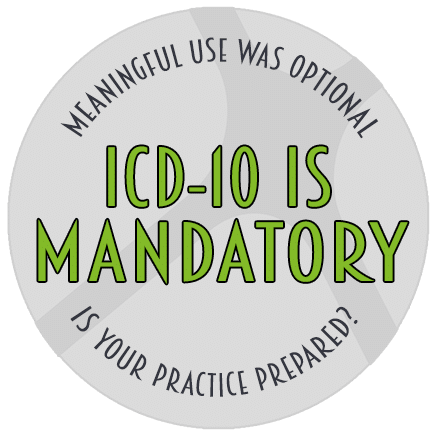

The disruptive nature of the transition to ICD-10 poses serious questions for specialty practices; and while we’ve worked to address many questions in this blog, including how ICD-10 works, key differences between it and ICD-9, steps for preparing your clinical functions and readying your overall practice, and how an EMR can minimize ICD-10 disruption, there still is one lingering question: Do we really need it?
The answer is absolutely yes, for two basic reasons.
Number one: Healthcare has advanced tremendously since 1978, the year of ICD-9’s official release, and the old standard simply hasn’t kept up.
Consider this: ICD-9 has no codes related to Ebola, and none can be added as we’ve run out of code combinations. Ebola can grab headlines nationwide, yet cases cannot be clinically documented in our “current” coding standard. That’s not an issue for the rest of the developed world, which has already moved on to ICD-10.
Number two: More important than what we can’t do with ICD-9 is what we can do with ICD-10’s amazing new levels of detail, specificity and accuracy.
 The fundamental need for ICD-10 is clinical; having far more information will give us a much more precise understanding of health conditions and outcomes, and will enable greater safety, greater quality and improved management of diseases and wellness. Going from around 14,000 diagnosis codes to approximately 69,000 means we can document and track tens of thousands of information points that elude us today.
The fundamental need for ICD-10 is clinical; having far more information will give us a much more precise understanding of health conditions and outcomes, and will enable greater safety, greater quality and improved management of diseases and wellness. Going from around 14,000 diagnosis codes to approximately 69,000 means we can document and track tens of thousands of information points that elude us today.
There is also a very real revenue cycle need for ICD-10, and practices will benefit further from having much more information built into the claims they submit. ICD-10 coding will reduce health plan requests for additional information – currently a major contributor to delayed reimbursements and denials – as payers receive, up front, much of what they now often request after the fact. As a result, payments will become more accurate as well as timely.
These gains are just the start. AHIMA published a highly detailed examination of ICD-10 benefits that, although a few years old, is still highly relevant – perhaps more so due to time lost in transition delays.
Whether we realize all of the benefits promised by ICD-10’s champions, the need is clear. Once the challenges surrounding the October 1, 2015, transition are in the rear-view mirror, and we are coding in the more advanced standard and realizing its benefits, we’ll look back at the preparation phase and realize that it was more than worth the effort.
HERE ARE SOME RELATED ARTICLES YOU MAY FIND INTERESTING
Regulatory & Compliance | Revenue & Finances
What Is PECOS? Step-by-Step Guidance for Specialty Practice Owners
By: Nextech | January 5th, 2026
MedSpa | Regulatory & Compliance | Aesthetics
IV Therapy Laws by State
By: Nextech | April 10th, 2025
MedSpa | Regulatory & Compliance | Aesthetics | podcast
The Current & Future State of the Medical Spa Business with Alex Thiersch
By: Tyler Terry | April 24th, 2024
